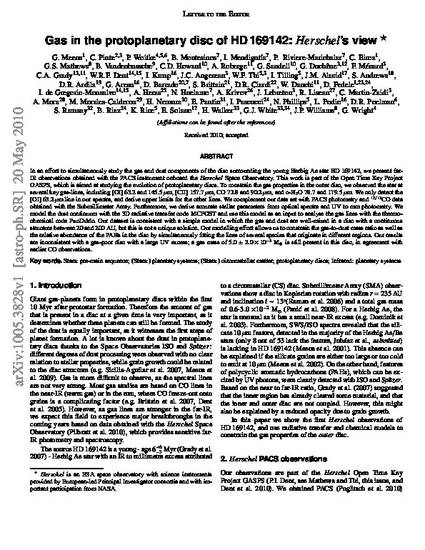
In an effort to simultaneously study the gas and dust components of the disc surrounding the young Herbig Ae star HD 169142, we present far-IR observations obtained with the PACS instrument onboard the Herschel Space Observatory. This work is part of the open time key program GASPS, which is aimed at studying the evolution of protoplanetary discs. To constrain the gas properties in the outer disc, we observed the star at several key gas-lines, including [OI] 63.2 and 145.5 mum, [CII] 157.7 mum, CO 72.8 and 90.2 mum, and o-H2O 78.7 and 179.5 mum. We only detect the [OI] 63.2 mum line in our spectra, and derive upper limits for the other lines. We complement our data set with PACS photometry and 12/13CO data obtained with the Submillimeter Array. Furthermore, we derive accurate stellar parameters from optical spectra and UV to mm photometry. We model the dust continuum with the 3D radiative transfer code MCFOST and use this model as an input to analyse the gas lines with the thermo-chemical code ProDiMo. Our dataset is consistent with a simple model in which the gas and dust are well-mixed in a disc with a continuous structure between 20 and 200 AU, but this is not a unique solution. Our modelling effort allows us to constrain the gas-to-dust mass ratio as well as the relative abundance of the PAHs in the disc by simultaneously fitting the lines of several species that originate in different regions. Our results are inconsistent with a gas-poor disc with a large UV excess; a gas mass of 5.0 ± 2.0 × 10-3 M&sun; is still present in this disc, in agreement with earlier CO observations. Herschel is an ESA space observatory with science instruments provided by European-led Principal Investigator consortia and with important participation from NASA.

Additional authors: D. R. Ciardi 22, W. Danchi 11, D. Fedele 1,23,24, I. de Gregorio-Monsalvo 14,15, A. Heras 25, N. Huelamo 7, A. Krivov 26, J. Lebreton 3, R. Liseau 27, C. Martin-Zaidi 3, A. Mora 28, M. Morales-Calderon 29, H. Nomura 30, E. Pantin 31, I. Pascucci 24, N. Phillips 5, L. Podio 16, D. R. Poelman 6, S. Ramsay 32, B. Riaz 24, K. Rice 5, E. Solano 17, H. Walker 33, G. J. White 33,34, J. P. Williams 8 and G. Wright 4
This manuscript has been published in the journal Astronomy & Astrophyiscs. Please find the published version here (note that a subscription may be necessary to access this version):
http://www.aanda.org/articles/aa/abs/2010/10/aa14557-10/aa14557-10.html
EDP Sciences holds the copyright in this article.